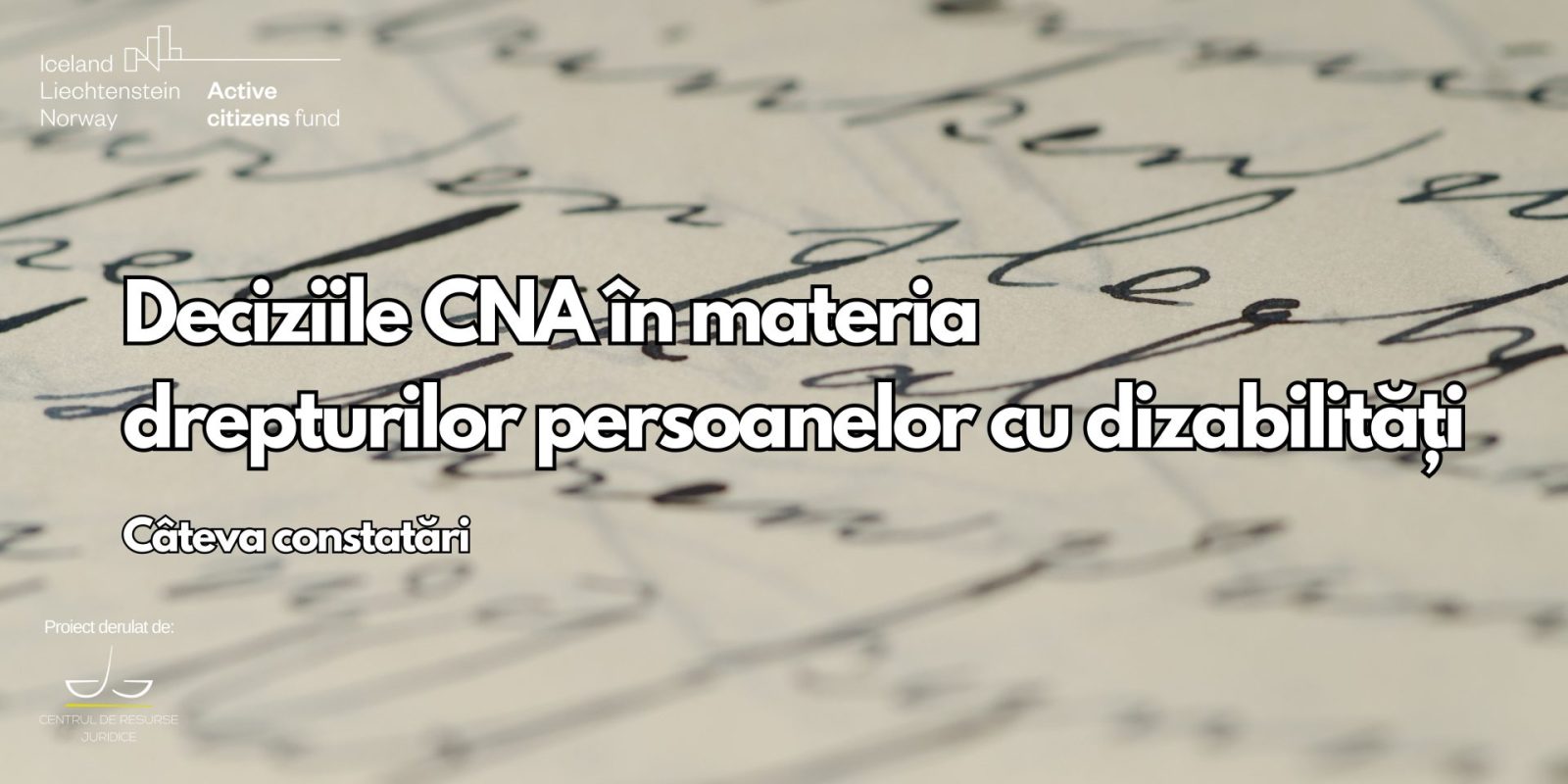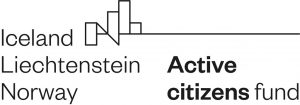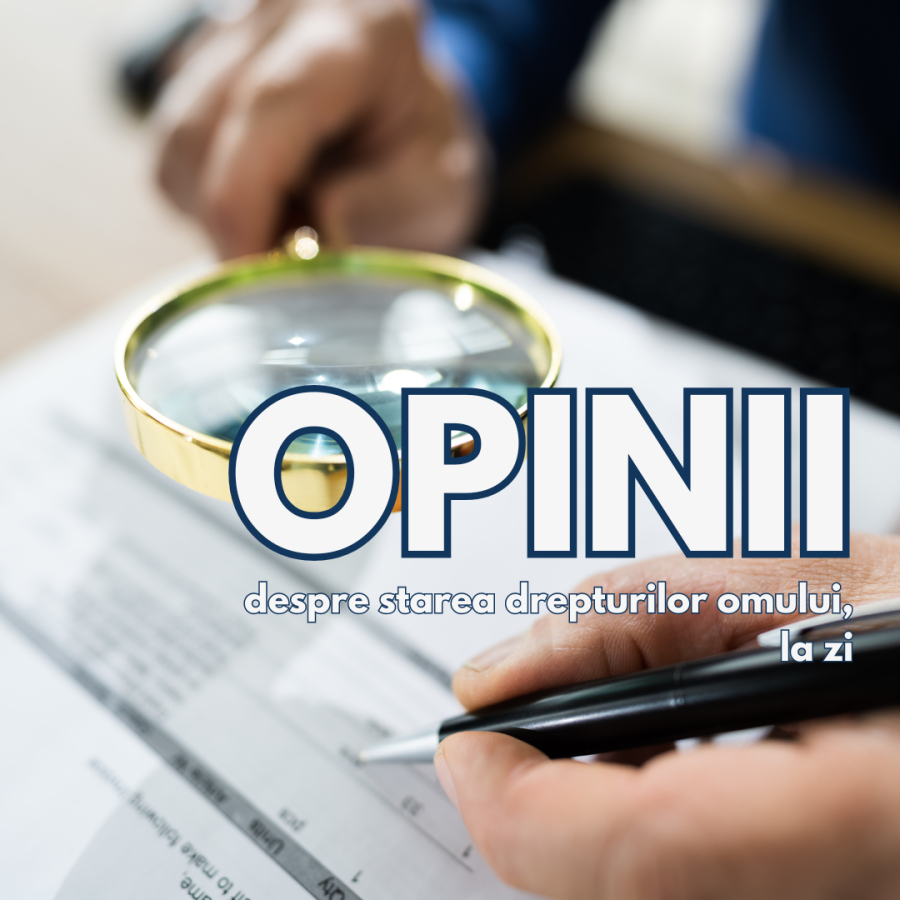Introductory aspects
At a time when the freedom of speech of the press in Romania is being called into question as a result of attacks on it[1] and when either incomplete or false narratives are infiltrating the various forms of content we consume, identifying and sanctioning hate speech in the media becomes all the more necessary. Citizens’ information diet has a direct impact not only on their personal views and collective mindset, but also on their actions and attitudes. Or, an information diet consisting of extremist rhetoric, discriminatory or hateful content, or false or out-of-context information will undoubtedly have an acute impact on the way people interact with their society.
This is where the National Audiovisual Council (NAC) comes in, as its mission includes overseeing compliance with the pluralistic expression of opinion in the audiovisual environment, preventing disinformation and sanctioning hate speech. This mission has become all the more urgent in the light of the increasing dangers of false narratives in recent years[2]. In this regard, this article will present a series of observations and findings on a number of decisions issued by the NAC between January 2022 and June 2023.
NAC decisions on disability
A first observation concerns the sample on which this article is based and the way in which the decisions on which we draw conclusions were selected. Thus, the decisions selected follow a request sent by the Centre for Legal Resources (CLR)[3] to the NAC[4], in which we asked for an indication of all the decisions in the above-mentioned timespan which concern the criterion of disability.
The context of the request is the lack of information on the discriminatory discourse towards people with disabilities, especially as a number of barriers faced by people with disabilities in Romania have been documented, indicating systematic discrimination and lack of reasonable accommodation for them in most areas. For example, adults with disabilities face difficulties in finding a job, with only 6% of them being employed[5]; there are few jobs offering accessible conditions for people with disabilities[6]. Another problem reported by the Diagnosis of the situation of people with disabilities in Romania is the limited access to social services in the community, which makes it difficult for people with disabilities to lead an independent life[7]. Discrimination against people with disabilities is also reflected in the education system, where only few teachers are trained to work with students with disabilities. In the 2019-2020 school year, only one in 20 teachers attended specialised training courses for learning how to interact with students with disabilities[8]. Collecting data on discrimination and other barriers is essential to help authorities implement concrete measures to support people with disabilities in all areas of life, ultimately leading to real, adequate respect for their rights.
The request from the CLR included the following points:
- The number and year of all NAC decisions from 01.01.2022 to 30.06.2023 that referred to violations of the provisions of the audiovisual legislation on incitement to hatred, discrimination, in general, including defamatory statements on the basis of disability, medical conditions, physical characteristics, genetics, chronic contagious or non-contagious disease[9].
The NAC indicated 21 of their decisions[10].
- number and year of all NAC decisions from 01.01.2022 – 30.06.2023 which have been reviewed under Art. 29 para. (1) letter d[11]) of the Broadcasting Act no.504/2002[12], specifically by the disability criterion provided for in the article, in how many cases the law was found to have been infringed and what was the total amount of the fines.
The NAC informed us that, up to the date on which the reply to the CLR’s request was sent, i.e. 24.07.2023, it had not imposed sanctions for violation of the provisions of Art. 29 para. (1) letter d).
- the number and year of all NAC decisions from 01.01.2022 to 30.06.2023 which have been analysed under Art. 40 para. (1) lit. a)[13] of the Broadcasting Act, specifically on the basis of the disability criterion set out in the Article, in how many cases the infringement of the law was observed and the total amount of the fines.
The NAC informed us that, up to the date on which the reply to the CLR’s request was sent, it had not imposed sanctions for violations of Article 40(1)(a).
- the number and year of all NAC decisions from 01.01.2022 to 30.06.2023 which were analysed under Art. 91^2 para. (1) lit. a)[14] of the Broadcasting Act, specifically according to the disability criterion set out in the article, in how many cases the infringement was found and the total amount of the fines[15].
The NAC informed us that, up to the date on which the reply to the CLR’s request was sent, it had not applied sanctions under Article 91^2 para. (1) letter a).
Thus, out of 21 decisions indicated by the NAC, we found that 3 of them concerned defamatory statements based on disability. In Decision No 201 of 2022[16], the phrases these ha*****pped politicians and this ha*****pped Cîțu guy are used to describe the political class in Romania, with the NAC noting the presence of language “offensive and likely to harm the dignity of people with disabilities”. Similarly, in Decision No 136 of 2022[17], phrases such as this ha*****pped Ciolacu, murderous moron or lunatics are used to criticise decisions taken by various politicians in the context of the pandemic. In Decision 284 of 2023[18], during a discussion on a television programme about the death of journalist Iulia Marin, the image of people living with mental health problems was damaged, with the NAC noting that the statements made by the guests were “likely to give rise to prejudices and stereotypes, and to stigmatise or discriminate against them”.
As for the other decisions, they concern discrimination or the promotion of hate speech based on the following criteria: belonging to the Hungarian ethnic minority (5)[19], sexual orientation or gender identity (4)[20], female sex (4)[21], skin colour and/or immigrant status (2)[22], belonging to the Roma ethnic group (1)[23], age (1)[24], belonging to the Jewish community (1)[25] and Ukrainian nationality (1)[26]. Referring strictly to the 21 decisions, we note that they reflect the results of country-wide research and surveys on minorities and communities against which hate speech is directed.
Effectiveness of sanctions in discouraging hate speech
Last but not least, this article draws attention to the low level of fines. The financial penalties provided for in Article 90 of the Audiovisual Law are fines of a minimum of 10 000 RON and a maximum of 200 000 RON. In 8 of the 21 decisions analysed, the NAC decided to grant non-pecuniary sanctions (7 of them took the form of a public summons to immediately cease illegal conduct, and one of them took the form of an obligation to broadcast for 10 minutes only the text of the sanctioning decision). The rest of the decisions took the form of sanctions with fines ranging from 10,000 to 20,000 RON in almost all cases, and one fine of 100,000 RON.
It should be recalled that we are referring to decisions finding violations of the provisions of broadcasting legislation on incitement to hatred and discrimination and that (appropriate and proportionate) sanctions can serve to deter further breaches of these provisions.
Challenges and questions on reporting hate speech
Beyond these issues, it should also be noted that the challenges involved in sanctioning hate speech also relate to the endeavour of bringing it to the attention of the NAC, and not only to the actual analysis carried out by the Council. Or, in the case of people with disabilities, there is a difficulty of referring the matter to the Council themselves, or even of acknowledging hate speech.
One of the ways in which this obstacle can be overcome is for people other than those affected by discrimination against people with disabilities to refer the matter to the Council or the proceeding of self-referring of the Council. However, as this analysis illustrates, by evaluating a sample that should have targeted the disability criterion, this does not happen often enough to address the level of discrimination in the media against people with disabilities.
Resources:
www.crj.ro/wp-content/uploads/2022/06/8.-Material-informativ-dizabilitati.pdf
Author: Raisa Manolescu, CLR volunteer
[1] Article ” Ringier sacked GSP editor-in-chief. Journalists accuse trust of pressuring gambling firms”, 03.10.2023, available at: https://romania.europalibera.org/a/libertatea-gsp-demitere-redactor-sef-ringier/32621412.html [2] We recommend, as a reference, the last CNA activity report, 2022 – pg. 72 “Council members considered the correct information of the public in the context of the spread of disinformation and the phenomenon of fake-news”, available at: www.cna.ro/IMG/pdf/1_CNA_Raport_de_activitate_pe_anul_2022.pdf [3] Request for public information CRJ no. 123/11.07.2023. [4][4] CNA response to request no. 8553/12.07.2023, sent to CRJ on 24.07.2023. [5] Article “State & firms in Romania pay 2.5 billion lei/year fine instead of giving a chance to a deaf or blind employee. Why?”, 21.01.2024, available at: https://romania.europalibera.org/a/mai-bine-amennda-decat-contracte-cu-angajati-cu-dizabilitati-doar-sase-la-suta-lucreaza/32783135.html [6] Disability situation forecast for Romania, 2021, available at: https://anpd.gov.ro/web/wp-content/uploads/2023/01/Diagnoza-situatiei-persoanelor-cu-dizabilitati-in-Romania.pdf [7] Idem, [8] Idem, [9] Request CRJ no. 123/11.07.2023, [10] Decision no. 136/01.03.2022, Decision no. 95/26.01.2022, Decision no. 98/27.01.2022, Decision no. 549/11.10.2022, Decision no. 121/15.02.2022, Decision no. 111/08.02.2022, Decision no. 606/17.11.2023, Decision no. 201/22.03.2022, Decision no. 531/29.09.2022, Decision no. 354/28. 07.07.2022, Decision No 222/07.04.2022, Decision No 87/18.01.2022, Decision No 136/02.02.2023, Decision No 248/30.03.2023, Decision No 403/13.06.2023, Decision No 161/14.02.2023, Decision No 183/23.02.2023, Decision No 284/27.04.2023, Decision No 214/23.03.2023, Decision No 380/23.05.2023 and Decision No 353/09.05.2023 [11] Art. 29 – (1) Audiovisual commercial communications broadcast by audiovisual media service providers shall comply with the following conditions: d) they shall not include or promote acts of discrimination based on sex, racial or ethnic origin, nationality, religion or belief, disability, age or sexual orientation; [12] Available at www.cna.ro/article12050,12050.html. [13] Art. 40 – (1) Audiovisual media services provided by providers under the jurisdiction of Romania shall not contain: a) Incitements to violence or hatred against a group of persons or a member of a group based on grounds such as sex, race, colour, ethnic or social origin, genetic characteristics, language, religion or belief, political or other opinion, membership of a national minority, property, birth, disability, age, sexual orientation or contagious or non-contagious chronic disease; [14] Art. 912*) – (1) The Council shall impose a fine on users of a video-sharing platform service that generates video material that: a) explicitly incites violence or hatred against a group of persons or a member of a group on grounds such as sex, race, colour, ethnic or social origin, genetic characteristics, language, religion or belief, political or other opinion, membership of a national minority, property, birth, disability, age, sexual orientation or chronic contagious or non-contagious disease; [15] CRJ request no. 8553 / 12.07.2023, [16] Available at: www.cna.ro/IMG/pdf/Dec201-NASUL_TV_am_10000_art_47_40_64_CA.pdf [17] Disponibilă la: www.cna.ro/IMG/pdf/Decizia_136-NASUL_TV_10_minute_3_LA_40_47_si_64_CA.pdf [18] Available at: www.cna.ro/IMG/pdf/Decizia284.pdf [19] Decision-354-2022, Decision-606-2022, Decision-136-2023, Decision-214-2023, Decision-353-2023, [20] Decision-98-2022, Decision-183-2023, Decision-380-2023, Decision-161-2023, [21] Decision-222-2022, Decision-531-2022, Decision-549-2022, Decision-403-2023, [22] Decision-95-2022, Decision-121-2022, [23] Decision-111-2022, [24] Decision-248-2023, [25] Decision-87-2022, [26] Decision-222-2022


